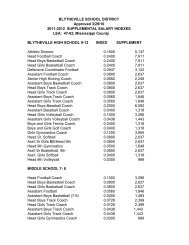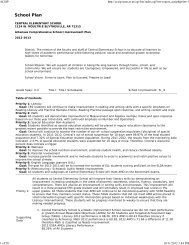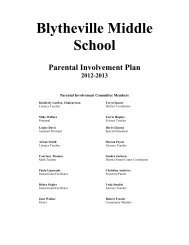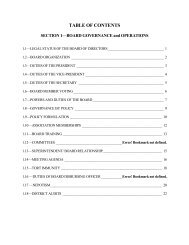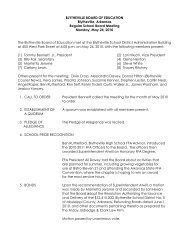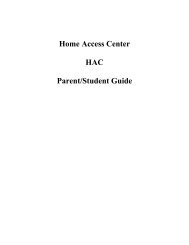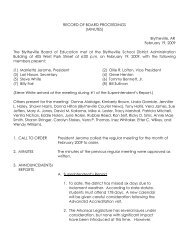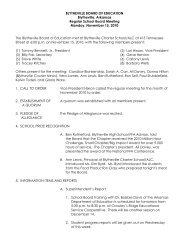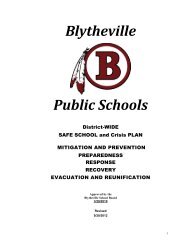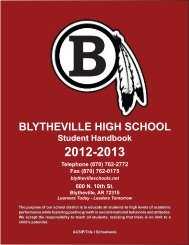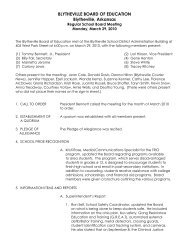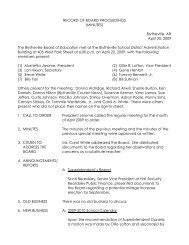Student Handbook - Blytheville Public Schools
Student Handbook - Blytheville Public Schools
Student Handbook - Blytheville Public Schools
Create successful ePaper yourself
Turn your PDF publications into a flip-book with our unique Google optimized e-Paper software.
will have access to and the responsibility for disclosing information in emergency situations.<br />
When deciding whether to release PII in a health or safety emergency, the District may take into account the totality of the circumstances<br />
pertaining to a threat to the health or safety of a student or other individuals. If the District determines that there is an articulable and significant<br />
threat to the health or safety of a student or other individuals, it may disclose information from education records to any person whose knowledge<br />
of the information is necessary to protect the health or safety of the student or other individuals.<br />
For purposes of this policy, the <strong>Blytheville</strong> School District does not distinguish between a custodial and noncustodial parent, or a non-parent such<br />
as a person acting in loco parentis or a foster parent with respect to gaining access to a student’s records. Unless a court order restricting such<br />
access has been presented to the district to the contrary, the fact of a person’s status as parent or guardian, alone, enables that parent or guardian<br />
to review and copy his child’s records.<br />
If there exists a court order which directs that a parent not have access to a student or his records, the parent, guardian, person acting in loco<br />
parentis, or an agent of the Department of Human Services must present a file-marked copy of such order to the building principal and the<br />
superintendent. The school will make good-faith efforts to act in accordance with such court order, but the failure to do so does not impose legal<br />
liability upon the school. The actual responsibility for enforcement of such court orders rests with the parents or guardians, their attorneys and the<br />
court which issued the order.<br />
A parent or guardian does not have the right to remove any material from a student’s records, but such parent or guardian may challenge the<br />
accuracy of a record. The right to challenge the accuracy of a record does not include the right to dispute a grade, which must be done only<br />
through the appropriate teacher and/or administrator, the decision of whom is final. A challenge to the accuracy of material contained in a student’s<br />
file must be initiated with the building principal, with an appeal available to the Superintendent or his designee. The challenge shall clearly identify<br />
the part of the student’s record the parent wants changed and specify why he/she believes it is inaccurate or misleading. If the school determines<br />
not to amend the record as requested, the school will notify the requesting parent or student of the decision and inform them of their right to a<br />
hearing regarding the request for amending the record. The parent or eligible student will be provided information regarding the hearing procedure<br />
when notified of the right to a hearing.<br />
Unless the parent or guardian of a student (or student, if above the age of eighteen [18]) objects, “directory information” about a student may<br />
be made available to the public, military recruiters, post-secondary educational institutions, prospective employers of those students, as well as<br />
school publications such as annual yearbooks and graduation announcements. “Directory information” includes, but is not limited to, a student’s<br />
name, address, telephone number, electronic mail address, photograph, date and place of birth, dates of attendance, his/her placement on the<br />
honor role (or the receipt of other types of honors), as well as his/her participation in school clubs and extracurricular activities, among others. If<br />
the student participates in inherently public activities (for example, basketball, football, or other interscholastic activities), the publication of such<br />
information will be beyond the control of the District. “Directory information” also includes a student identification (ID) number, user ID, or other<br />
unique personal identifier used by a student for purposes of accessing or communicating in electronic systems and a student ID number or other<br />
unique personal identifier that is displayed on a student’s ID badge, provided the ID cannot be used to gain access to education records except<br />
when used in conjunction with one or more factors that authenticate the user’s identity, such as a personal identification number (PIN), password<br />
or other factor known or possessed only by the authorized user,<br />
A student’s name and photograph will only be displayed on the district or school’s web page(s) after receiving the written permission from the<br />
student’s parent or student if over the age of 18.<br />
The form for objecting to making directory information available is located in the back of the student handbook and must be completed and signed<br />
by the parent or age-eligible student and filed with the building principal’s office no later than ten (10) school days after the beginning of each<br />
school year or the date the student is<br />
enrolled for school. Failure to file an objection by that time is considered a specific grant of permission. The district is required to continue to honor<br />
any signed-opt out form for any student no longer in attendance at the district.<br />
The right to opt out of the disclosure of directory information under FERPA does not prevent the District from disclosing or requiring a student to<br />
disclose the student’s name, identifier, or institutional email address in a class in which the student is enrolled.<br />
Parents and students over the age of 18 who believe the district has failed to comply with the requirements for the lawful release of student<br />
records may file a complaint with the U.S. Department of Education at<br />
Family Policy Compliance Office<br />
U.S. Department of Education<br />
400 Maryland Avenue, SW<br />
Washington, DC 20202<br />
Date Adopted: 02/23/04 Last Revised: 04/23/12<br />
4.14—STUDENT PUBLICATIONS AND THE DISTRIBUTION OF LITERATURE<br />
<strong>Student</strong> <strong>Public</strong>ations<br />
All publications that are supported financially by the school or by use of school facilities, or are produced in conjunction with a class shall be<br />
considered school-sponsored publications. School publications do not provide a forum for public expression. Such publications, as well as the<br />
content of student expression in school-sponsored activities, shall be subject to the editorial control of the District’s administration whose actions<br />
shall be reasonably related to legitimate pedagogical concerns and adhere to the following limitations.<br />
1. Advertising may be accepted for publications that does not condone or promote products that are inappropriate for the age and maturity of<br />
9



